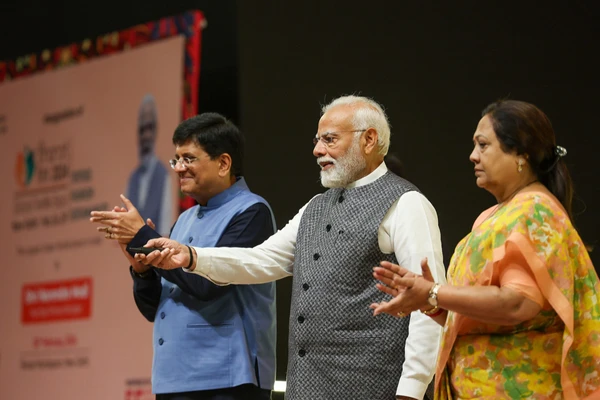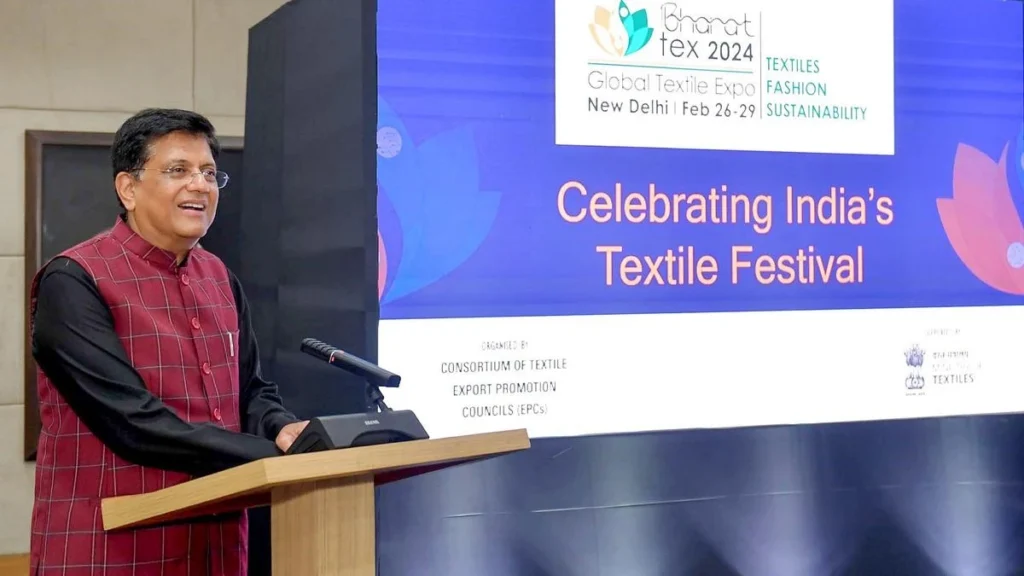BHARAT TEX 2024, India’s Largest Textiles Mega Event concluded recently.
About BHARAT TEX 2024:
- It was organised by a consortium of 11 Textile Export Promotion Councils and supported by the Ministry of Textiles.
- Built on the twin pillars of trade and investment and with an overarching focus on sustainability, the event attracted besides policymakers and global CEOs, 3,500 Exhibitors, 3,000 Buyers from 111 Countries and over one lakh trade visitors.
- The event was hosted simultaneously at two venues- Bharat Mandapam and Yashobhoomi.
- All major textile organizations and brands from around the world were represented in the event.
- Multilateral Organizations and Global Think Tanks including UNEP, IRENA, etc. were part of the event.
Launch Pad for various initiatives:
- Bharat Tex emerged as Launch Pad for various initiatives and Projects such as IndiaTEX, Launch of Textile Grand Innovation Challenge.
- The event also saw release of UNEP Report for Sustainable Textile Hub in India and 8 books on various technical topics and a Documentary on Women Empowerment in Silk sector.
About IndiaTEX:
- The project ‘Accelerating the Transition of the Indian Textile Sector towards Circularity’ (IndiaTex) is a four-year UNEP project funded by the Ministry of Foreign Affairs of Denmark and implemented in collaboration with the Government of India’s Ministry of Textiles.
- It is a part of the One UNEP Textile Initiative.
- The One UNEP Textile Initiative is a project that aims to accelerate the transition to a sustainable textile industry.
- IndiaTex aims to accelerate the transition of the Indian textile sector towards circularity.
Key concept:
- Eco-innovation approach: Guides SMEs in incorporating circularity and resilience into every aspect of their business strategy and underlying business models, operations, products, and processes to reduce the environmental and social impact of human activity.
- The European Commission’s Product Environmental Footprint (PEF): Measures the environmental performance of a good or service throughout its life cycle (from extraction of raw materials, through production and use, to final waste management).
- Circularity: Provides a model to transform the current economic system towards a sustainable future.
- Circularity builds on a guiding principle: ‘’Reduce by design’’, as well as value-retention processes: Refuse, Reduce, Reuse, Repair, Refurbish, Remanufacture, Repurpose and Recycle.
Benefits:
- The project will build capacity and support the development and implementation of circular textile policies.
- It will create convening opportunities for government, companies and organisations to coordinate and align on circular textiles ambition at national, regional and global level.
- In an interconnected global value chain, integrating circular practices will improve the sector’s competitiveness and market access.
- India’s textile clusters are a particularly effective method to speed India’s transition to circularity.
About Textiles Grand Innovation Challenge:
- The Ministry of Textiles, in collaboration with Startup India and DPIIT, is initiating an innovation challenge.
- This aims to tap into unexplored innovation opportunities, identifying futuristic circular solutions with proven concepts and significant potential for replication and scalability within India’s Textiles and Apparel industry.
Ref:Source
| UPSC IAS Preparation Resources | |
| Current Affairs Analysis | Topperspedia |
| GS Shots | Simply Explained |
| Daily Flash Cards | Daily Quiz |



